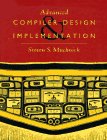|
|

| |
| COMS W4115 Programming Languages and Translators Spring 2002 |
||
| Home |
| General Information | ||
| Classes meet Monday and Wednesdays from 2:40 to 3:55 PM in Room 207, Mathematics. | ||
| Office hours for the instructor are on his home page | ||
| Office hours for the TAs are on the secondary class home page | ||
| Overview | ||
|
The goal of PLT is to teach you both about the structure of
computer programming languages and the basics of implementing
compilers for such languages.
The course will focus mostly on traditional imperative and object-oriented languages, but will also cover functional and logic programming, concurrency issues, and some aspects of scripting languages. Homework and tests will cover language issues. You will implement a simple compiler for the Tiger language in a semester-long group project. While few of you will ever implement a full commercial compiler professionally, the concepts, techniques, and tools you will learn have broad application. |
||
| Prerequisites | ||
| COMS W3156 Introduction to Software Engineering: You will be dividing into teams to build a compiler, so you need to have some idea how to keep this under control | ||
| COMS W3261 Computability and Models of Computation: You will need an understanding of formal languages and grammar to build the parser and lexical analyzer. | ||
| COMS W3824 Computer Organization: We will be generating assembly code, so you need to understand how to write it. | ||
| Required Text | ||
 Michael L. Scott.
Michael L. Scott. Programming Language Pragmatics Morgan Kaufmann, 2000 Near Columbia, this is available at Papyrus Booksellers at the corner of 114th and Broadway. Textbooks are downstairs. |
||
| Optional Texts | ||
 Andrew W. Appel.
Andrew W. Appel. Modern Compiler Implementation in Java. Cambridge University Press, 1998. This focuses much more on compiler construction than Scott, but does not discuss as many diverse language issues. It is the source for the Tiger language used in the project. |
||
 Alfred V. Aho, Ravi Rethi, and Jeffrey D. Ullman.
Alfred V. Aho, Ravi Rethi, and Jeffrey D. Ullman. Compilers: Principles, Techniques, and Tools. Addison-Wesley, 1985. Long the standard text on compilers, the ``dragon book'' is now a little dated. It remains one of the more readable books on the topic. |
||
 Steven S. Muchnick
Steven S. Muchnick Advanced Compiler Design and Implementation. Morgan Kaufmann, 1997. A very extensive book on many aspects of compiler design. Starts about halfway through Appel and goes much farther. Recommended for serious compiler hackers only. |
||
| Schedule | ||
| Programming Assignments | ||
| The class is centered around a compiler implementation project divided into four programming assignments as follows: | ||
| 1. |
Build a scanner/parser and generate an AST
|
|
| 2. |
Perform static semantic checking on the AST
|
|
| 3. |
Dismantle the AST into three-address code
|
|
| 4. |
Generate assembly code
|
|
|
|
The language reference manual, adapted from Appel. | |
|
|
A two-page introduction to ANTLR. | |
|
|
We will be implementing a compiler for the Tiger language described in Appel. | |
|
|
The compiler will be implemented in the Java language. | |
|
|
We will be using ANTLR for constructing much of the compiler. | |
|
|
We will be using the SPIM simulator for executing the MIPS assembly code we will produce. | |
| Class Policies | ||
| Grading |
40 % Project 25 % Midterm 1 25 % Midterm 2 10 % Homework |
|
| Collaboration | You will collaborate with your own small group on the programming project, but you may not collaborate with others on homeworks. Groups may share ideas about the programming assignments, but not code. Any two groups found submitting similar code will receive zero credit for the whole assignment, and repeat offenses will be referred to the dean. See Columbia academic policies for more details. | |
| Late Policy | Zero credit for anything handed in after it is due without explicit approval of the instructor. | |
| Related Classes | ||
|
|
COMS W4115 from Fall 2001 taught by Michah Lerner | |
| Copyright © 2001 Stephen A. Edwards | Updated Thu May 2 16:55:33 EDT 2002 | All Rights reserved |